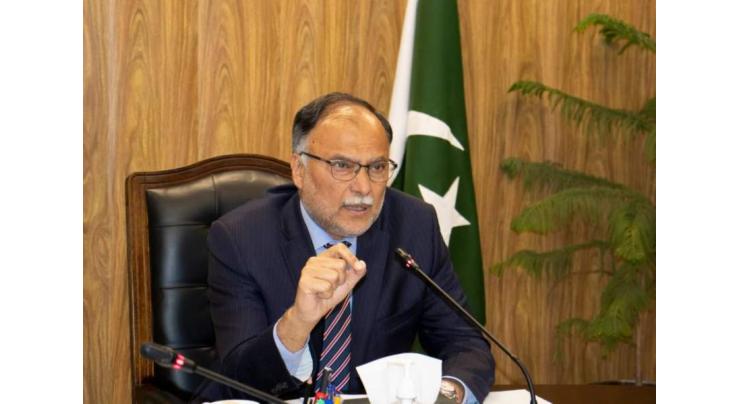
- Home
- Business
- News
- Ahsan Iqbal emphasizes need of professional officers, technocrats to achieve government's objectives
Ahsan Iqbal Emphasizes Need Of Professional Officers, Technocrats To Achieve Government's Objectives
Mohammad Ali (@ChaudhryMAli88) Published May 14, 2024 | 08:02 PM

Federal Minister for Planning, Development and Special Initiatives Ahsan Iqbal on Tuesday said that that there was an urgent need for skilled and professional officers and technocrats to achieve the fundamental objectives of the government
ISLAMABAD, (UrduPoint / Pakistan Point News - 14th May, 2024) Federal Minister for Planning, Development and Special Initiatives Ahsan Iqbal on Tuesday said that that there was an urgent need for skilled and professional officers and technocrats to achieve the fundamental objectives of the government.
He stated this while presiding over a high-level meeting to discuss the role and reforms of the Planning Commission with a committee formed on the instructions of the prime minister , said a press release issued here.
During the meeting, important aspects of economic reforms and capacity building necessary for sustainable development of Pakistan were reviewed.
Federal Minister for Power and Water Resources, Mossadeq Malik, MNA Ali Pervez Malik, Planning Secretary, Cabinet Secretary and senior officials of the Ministry of Planning participated in the meeting.
Ahsan Iqbal reiterated the importance of capacity building within line ministries to ensure the efficient preparation of project proposals (PC-Is), thereby enabling the Planning Ministry to focus on strategic planning and thought leadership.
The minister emphasized that over the past 16 months, sector specialists from the market had been recruited within the Planning Ministry to strengthen the technical capabilities across diverse sectors and accelerate project completion.
He emphasized that over the past 16 months, the sector specialists from the market had been recruited within the ministry to strengthen the technical capabilities across diverse sectors and accelerate project completion.
Ahsan Iqbal acknowledged the effective functioning of the operational and technical sections within the ministry.
However, he emphasized the need to attract top talent from the market to enhance thought leadership within the ministry.
To achieve this, the minister signified the importance of revised remuneration, adding “We have to revise our pay scales to attract people with professional skills and experience from the market.
"
Reflecting the past achievements, Ahsan Iqbal cited the successful formulation and implementation of Vision 2025 during 2013-18.
In addition, the Planning Ministry has the credit of achieving substantial savings amounting to Rs 700 billion from the Public Sector Development Programme (PSDP) over five years from 2013 to 2018. This accomplishment was made possible through rigorous scrutiny of PSDP projects and careful financial management.
Addressing the allocation of funds, the minister stressed the necessity of establishing clear benchmarks for PSDP financing in light of the devolution of powers to provinces post-18th amendment to enable informed decision-making by the federal government and reduce burden on PSDP.
While deliberating on suggestions to improve the efficiency of Planning Commission, he expressed that during 2013 to 2018, the same ministry and Planning Commission achieved all goals with great success despite having limited resources.
“Vision 2025 was also put forth by the Planning Commission. There is no doubt that the role of the Ministry of Planning is commendable.” he said, adding that after the 18th amendment, following the transfer of powers to all the provinces, a clear policy regarding PSDP financing could not be given till date.
The committee officials agreed that the present structure of the Planning Commission predated the 18th Amendment.
The meeting concluded with the decision that actionable steps addressing each existing challenge would be taken to re-examine the structure of Planning Commission and make necessary reforms.
Looking ahead, Ahsan Iqbal emphasized the trans-formative potential of the Fourth Industrial Revolution and the need for adaptive strategies to capitalize on emerging opportunities.
He highlighted the imperative of reevaluating existing governance structures.
Related Topics
Recent Stories

Americans oblivious to US historic World Cup win, while Pakistan mourns: NYT com ..

ECP resorts to provincial officers as judicial request stalls: Spokesperson

Meeting discuss preparations for monsoon season

Hameed Haroon awarded for contributions to art, design, media & cultural

Police arrests impostor posing as cop in Hazro

ICC T20 World Cup 2024: Australia lose two wickets for 70 runs against England

AJK PM advises authorities for early provision of due facilities to Muzaffarabad ..

Fresh heat wave to hit entire J&K State from Sunday, June 10: Weather experts pr ..

Lahore-Paris Rally logo launched at Alhamra

Secretary Health of Balochistan, Saleh Baloch visits MSD

Lansana Wonneh, Representative of UN Women Pakistan met with the Speaker GB Asse ..

Oinic lights up Times Square’ in support of Pakistan for T20 World Cup 2024
More Stories From Business
-

Azad Jammu and Kashmir (AJK) Minister for Small Industries Dr. Kausar Taqdees Gilani for small indus ..
10 hours ago -

Cyberabad rolled out from Faisalabad
10 hours ago -

CCP signs first international MoU with Chinese market regulator
12 hours ago -
Gold rates dip by Rs.3,600 per tola to Rs.239,400
13 hours ago -

Punjab Livestock Card and Farmers' Guidance App; check details here
13 hours ago -
FPCCI stresses investment friendly policies to protect country’s economy
13 hours ago
-

Stronger ties between LCCI and AJK chamber stressed
13 hours ago -
CCP recovers Rs 5m penalty from APNS
13 hours ago -

US stocks edge lower as traders weigh jobs report
12 hours ago -

Currency Rate In Pakistan - Dollar, Euro, Pound, Riyal Rates On 8 June 2024
22 hours ago -

Today Gold Rate in Pakistan 08 June 2024
22 hours ago -

1,300 Pakistani rice containers release after Commerce Minister's intervention
1 day ago














